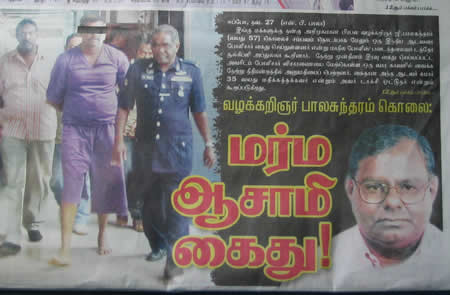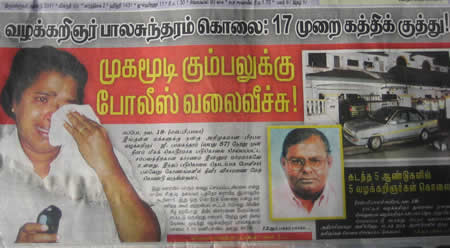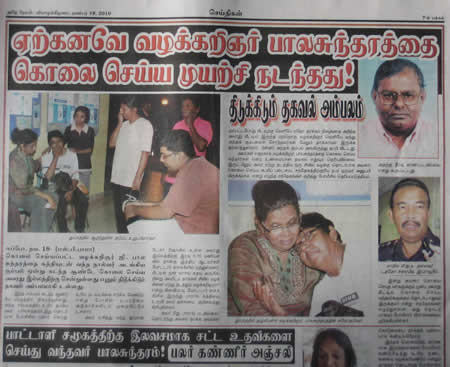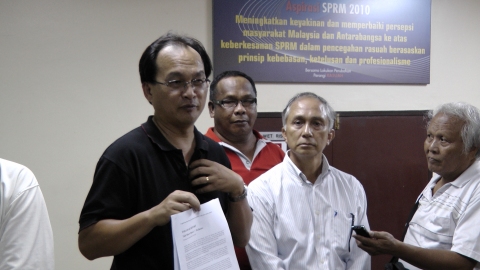Kua Kia Soong
What RM1 billion can buy? Most of us do not realize the proportion of the country’s wealth being spent on arms, the commissions being paid for arms and in many cases, questionable purchases of such arms. Compare that with the gross shortage of schools and hospitals, public transport and other social services that so many Malaysians face and the obscenity of it all can be clearly seen.
For example, RM1 billion worth of arms is equivalent to building at least 100 hospitals or 1000 new schools or 10,000 new houses. Do you know that since Independence in 1957 – after more than 50 years - there has not been a single new Chinese or Tamil primary school built? In fact we had more Chinese and Tamil primary schools then (1,350 and 880 respectively) compared to the present (1285 and 550 schools respectively). And the population at Independence was only half what it is today!
But in one weekend alone in April 2010, the BN Government could justify spending RM10 billion on arms at the Kuala Lumpur Defence Fair. With that money, we could have built 1000 hospitals or 10,000 schools or 100,000 houses! The Tenth Malaysia Plan (2011-15) has allocated RM23 billion for defence and security.
Malaysia’s Recent Splurge on Arms
In Malaysia, although the last war against Indonesian “Confrontation” was over more than forty years ago, the BN Government has still made available ample funds for the Defence Minister to purchase state-of-the-art defence equipment all these years. “Military modernization” has become a new catch-word for the Defence Ministry in Malaysia to justify defence budgets out of all proportion to the national budget. At the same time, the military-industrial complexes of the West have convinced their own governments that one way to keep their economies buoyant is to sell more weapons abroad, especially to Second and Third World countries where the flashpoints tend to occur.
Up to now, there has been a lack of public outcry over the size of the defence budget in Malaysia. And while the alternative front, Pakatan Rakyat never fails to expose corruption and non-transparency in arms purchases, their alternative defence policy is not evident.
Thus, what is the purpose of this entire splurge on arms by the BN Government? Does it make sense in the light of the regional status quo and the state of our economic development? How is Malaysia’s defence budget being spent? Malaysia already has eight US-made F/A-18D jet fighters. Six Russian MiG-29s have been retired but another 10 aircraft will continue to be maintained by Aerospace Technology System in Malaysia for several years. Malaysia is seeking enough fighters for one to two squadrons. As well as the Russian Sukhoi Su-30s, other fighters Malaysia is considering include the Boeing F/A-18E/F Super Hornet, Lockheed Martin F-16 and Saab Gripen.
The Defence Ministry also wants to replace its 20 Sikorsky S-61 Nuri helicopters, the first of which it received in 1968. The Eurocopter EC725 was chosen in 2007 after the government had evaluated the Agusta Westland AW101, Mil Mi-17 and Sikorsky S-92. However, the deal was called off after criticism from opposition political parties.
A Futile and Wasteful Arms Race in ASEAN
The arms race among the Southeast Asian countries seems the most pointless after all the talk at conferences on ASEAN integration. Even so, each country’s attempt to be ahead in the race is self-defeating. For example, does Malaysia’s acquisition of 18 Su-30MKM planes change the balance of power in the immediate region? This is doubtful since Thailand operates 57 F-16A/Bs & has 6 Gripens on order while Singapore has even more jet fighters including F-16C/Ds, F5s and F-15SGs on order.
China's increased regional power has also given its Southeast Asian neighbours such as Malaysia an excuse to step up their own defence purchases even though our leaders keep stressing they do not see China as a threat in the region. Figures from the Stockholm International Peace Research Institute show that Southeast Asia’s top five arms importers – Thailand, Indonesia, Malaysia, Burma and Singapore – spent more than US$8 billion on weapons between 1992 and 1996.
In 1997, Malaysia was described as one of “East Asia’s Big Eight” countries devoting “lavish resources” to develop its military industries. The Bulletin of the Atomic Scientists said that these countries – China, Japan, Taiwan, Indonesia, South Korea, Thailand, Singapore and Malaysia – were enhancing their capabilities in military organization, arms purchases, and military industrialization.
Malaysia’s rivalry with Singapore springs not from ideological differences but from the latter’s forced separation from the Malaysian federation in 1965, after a crisis emanating from the racial politics of their ruling classes. From this rivalry we can see how the ensuing arms race has burdened the peoples in the two countries with billions in arms spending.
The Non-Aligned Movement was founded upon the principles of peace, neutrality and impartiality to the Superpowers. A genuine non-aligned policy can therefore go a long way toward ridding us of the need to procure expensive arms.
Malaysia’s Military-Industrial Complex
Many are not aware of the rapid growth of Malaysia’s domestic military-industrial complex. The top brass of the military guard their power and privilege and this is nourished by easy access to the defence budget and the simple justification of “national security”. Today we have seen the growth of such a complex in many countries, including Malaysia. An offshoot of the arms purchases is the race to develop domestic defence equipment industries in each of the S.E. Asian countries. In 1993, aerospace became a new strategic sub-sector of Malaysia’s manufacturing sector. This sector is both capital intensive and involves high technology.
With the burgeoning of a domestic military economy, we see class interest developing between the ruling elite and the top brass of the military. As it happens, there is now an extensive military automotive complex in the Prime Minister, Najib’s electoral constituency of Pekan with its layers of contractors, sub-contractors, servicemen and other gainfully employed.
We also find many retired generals and other officers of the armed forces in the directorships of many if not most of these local aerospace companies. This brings into focus questionable practices in the Malaysian civil and military services when we see top military and civil servants retiring into directorships of utility and arms companies.
Most military contracts come with purchase agreements involving local spin-offs. For example, Malaysia’s Airod has an agreement for aircraft maintenance with the US Lockheed Corporation and is trying to gain a foothold in the regional aircraft upgrading market, estimated to be worth $1 billion yearly. British Aerospace’ sale of 28 Hawk ground attack aircraft to Malaysia in the early 1990s came with an offset package including the manufacture of air-frame components, cannon, ammunition and tyres in Malaysia. These products would not only be fitted to the Hawks sold to the RMAF but could also be exported to other countries using the same aircraft.
Bumiputera companies have made a mark in the local aerospace industry and the Directory of Malaysian Defence Industry Companies 2000 published by the Malaysian Industries Defence Council already listed 18 aerospace companies. Thus while most businesses are subject to market forces, defence enjoys a great deal of “featherbedding” – contracts are awarded without competition and the sector has its own government blessed “aerospace” industrial policy.
The significance of this domestic military-industrial complex to the composition of the ruling class, class relations, a right-wing tendency, patronage, employment and the outcome of elections cannot be underestimated.
Arms for Aid Scandal, 1994
The “Arms for Trade” scandal, involving the funding of the Pergau hydroelectric dam in Malaysia, revolved around the linking of arms sales (worth RM5 billion) to British overseas aid, in the form of Aid-and-Trade Provision (ATP) funding. The linkage came to light when a senior civil servant in the British Overseas Development Administration (ODA), Sir Tim Lankester, objected to the funding of the un-economical and environmentally damaging dam in 1991 but his objections were over-ruled by the then Foreign Secretary, Douglas Hurd.
It was stated British government policy that there could be no such linkage. This government policy was based on the 1966 Overseas Aid Act. Allegations of corruption were levelled at the Malaysian government, specifically in the Sunday Times. It provoked a backlash by Mahathir’s government which announced a ‘Buy British Last’ policy in 1994. Soon after, the editor of the Sunday Times at the time, Andrew Neil lost his job as editor because of the political impact of the investigations of Pergau.
While the mainstream press in Malaysia published hardly anything on the “Arms for Aid” scandal which had erupted in Britain in 1994, the British press had a field day which subsequently led to Mahathir’s second trade boycott against Britain. These revelations in the British press on the scandal are published in this book for the first time in Malaysia.
The Murder of Altantuya and the Scorpene Deal
It took the brutal murder of a Mongolian national, Altantuya Shaaribuu in 2006 to shock the nation and for questions surrounding the purchase of two Scorpene submarines to be asked in this country and in France. Altantuya, a Mongolian translator was shot in the head on October 19, 2006, and then blown up with C4 explosives which are available only from Malaysia’s military.
According to testimony in the trial, Altantuya accompanied her then-lover Abdul Razak Baginda to Paris at a time when Malaysia’s Defence Ministry was negotiating through a Kuala Lumpur-based company, Perimekar Sdn Bhd, to buy two Scorpene submarines and a used Agosta submarine produced by the French government under a French-Spanish joint venture, Armaris. Perimekar at the time was owned by a company called Ombak Laut, which was wholly owned by Abdul Razak. The contract was not competitive.
The Malaysian Ministry of Defence paid 1 billion euros (RM 4.5 billion) to Amaris for the three submarines, for which Perimekar received a payment of 114 million euros (RM510 million). The total cost of the submarines purchase after including infrastructure, maintenance, weapons, etc. has risen beyond RM7 billion. The Deputy Defence Minister Zainal Abdidin Zin told the Dewan Rakyat, Malaysia’s parliament, that the money was paid to Perimekar for “coordination and support services” although the fee amounted to a whopping 11 percent of the sales price for the submarines.
Altantuya, by her own admission in the last letter she wrote before her murder, said she had been blackmailing Abdul Razak, pressuring him for US$500,000. She did not say how she was blackmailing him, leaving open lots of questions. While two former bodyguards of the then Deputy Prime Minister and Defence Minister were subsequently found guilty of her grisly murder, it raised suspicion of official cover up since their motives were never divulged to the public nor probed in court. Altantuya had had a relationship with Abdul Razak Baginda, a defence analyst from the Malaysian Strategic Research Centre think-tank, with ties to Najib Razak. She had worked as Abdul Razak’s translator on a deal to purchase Scorpene submarines from France. Chapter three looks at the murder of Altantuya and its link with the purchase of the Scorpene submarines.
An Integrated and Accountable Military?
Experts say that Malaysia's air force suffers from too many aircraft types and aircraft that fail to keep up with recent purchases by its neighbours. Chapter 4 chronicles an exhaustive record of negligence, non-accountability and non-integration in the Malaysian defence sector through the years. The recent case of the missing jet engines was by no means exceptional when seen in the light of these scandals, viz. the 12 Eurocopter helicopters costing RM2.3 billion; the 27 offshore vessels ultimately to cost RM24 billion to be built by PSC-Naval Dockyard; the operational problems faced by the newly acquired Hawk fighters in 1996; the missing Skyhawks in the 1980s.
The questions Malaysians want answered are: Is the Malaysia government buying the BEST aircraft in terms of value for money? Was there a feasibility study conducted to compare prices and functionality of these copters? In the first place, why was there an issue with the proposed purchase that necessitated the PAC to conduct an investigation?
Wastage and Tragedies
Besides having to pay for the exorbitant military budget through the years, the human casualties and the loss of these very expensive aircraft is not acceptable. Apart from the tragic loss of lives of our servicemen and women, one wonders if we have been short changed by the arms suppliers or if there has been compromises on the price, quality of the equipment or even if we have adequately trained personnel to fly these ultra modern, high-tech jet fighters. And of course, the quality of management and system of accountability have been called into question often enough in the armed forces.
From 1968 to 1997, the crashes of Sikorsky Nuri helicopters had claimed 73 lives in all.
The Defence Minister, Datuk Syed Hamid Albar who was in the United States at the time, said there was no plan to retire the Nuris; instead, the remaining Sikorsky 61A-4 Nuris would be upgraded to extend their life span. They had been in service for 22 to 30 years up until 1997.
From 1970 to 1995, there were four De Havilland Caribou aircraft crashes killing at least 17 servicemen. Then there was the crash of the Super Puma helicopter in January 1994 in which four crew members lost their lives. The Super Puma was on its way to fetch then Deputy Prime Minister Datuk Seri Anwar Ibrahim and his delegation in Kangar when it crashed.
It was the 15th crash involving aircraft of the Royal Malaysian Air Force since 1990 – five involved the Pilatus PC-7 basic training aircraft; four were A-4PTM Skyhawk fighter bombers. The other incidents included the Alouette III helicopter, the Cessna 402 aircraft, a Nuri helicopter and Hercules C-130 transport aircraft. It was remarked that we have lost more aircraft and pilots through accidents than through war combat.
A Military Dominated by One Ethnic Group
Despite Najib’s “1Malaysia” policy, the Malaysian military remains dominated by one ethnic group. Although there are some ethnic Indians and Chinese in the Malaysian Armed Forces, the top brass are exclusively Malay. The Royal Malay Regiment, the premier corps in the Infantry, remains exclusively Malay.
Two years after the May 13 Incident, in 1971 non-Malays constituted about 50 per cent of army officers; sixteen out of every hundred soldiers were non-Malays; the Malay and non-Malay officers’ ratio in the RMN was 50-50 while in the Air Force, more than half the officers were non-Malays; non-Malays formed 25 per cent of the navy’s other ranks while in the air force, it was 40 per cent.
By 1981, the Malay composition in the armed forces had reached more than 75% for officers and 85% for the rank and file. However, in 1993, the number of non-Malay officers in the 90,000-strong army had dipped below 15 per cent. For the other ranks, non-Malays constituted about nine per cent. The situation was even worse in the police force. It was estimated that in 1993, Chinese comprised only five per cent of the 76,000-strong force.
In 2002, then Chief of Defence Forces, General Tan Sri Mohamed Zahidi Zainuddin revealed that non-Malays made up less than 10% of the armed forces, which had about 110,000 personnel. (36) Today, it is safe to estimate the percentage of Malays in the armed forces to be more than 90%. As in the other sectors of Malaysian society, this domination of the military and the police by one ethnic group does not serve the interest of multi-culturalism in the Malaysian nation we want to build.
Checking BN’s Defence Spending
There is no doubt that ever since the Malaysian peoples’ “political tsunami” of 8 March 2008, the Barisan Nasional Government has been forced to be more circumspect about authorizing any big defence procurements for fear of losing electoral support. For instance, the BN government was forced to stall the planned purchase of the Eurocopter EC 725 helicopters. Nevertheless, this has not stopped the same BN government from allocating a record RM23 billion, or 10% of the total development allocation under the Tenth Malaysia Plan for defence and security.
It is clear that the BN Government could get away with such huge defence budgets during the last few decades because of the erosion of these safeguards in our democratic system, viz. dominance of the executive over parliament; loss of public accountability; absence of Freedom of Information legislation; inadequate separation of powers between the executive and the judiciary; poor safeguards for civil rights.
However, it is important that while Pakatan Rakyat highlights the corruption involved in arms procurements by the BN, they also present their alternative defence policy to the rakyat at the next general elections.
Stopping the Arms Race in ASEAN
Disarmament must ultimately be inclusive of all the nations within ASEAN. The peoples in ASEAN deserve a better quality of life compared to the status quo which is committed to an irrational arms race among the ASEAN countries themselves and deprives their peoples of valuable resources for social development. The financial crisis toward the end of the 1990s gave us a vision of a region without an arms race. It was not because the political leaders had come to their senses - simply that countries in the region could no longer afford expensive military equipment. Indonesia announced in 1998 that it would cut military spending by up to US$20 billion.
An obligatory ASEAN register of conventional arms is a good first step toward increased transparency in exposing the armaments of each ASEAN country. However, the register needs to be expanded to ensure that each country provides greater detail about their arms procurements and these have to be cross-checked with other sources. Beyond imports and exports, the Register should include each country’s capabilities, inventories and production levels.
Minimising the defence budget in Malaysia and throughout ASEAN can free more valuable resources into urgently needed social services and socially useful production. Wasting money on arms prevents it from being spent on health, education, clean water or other public services. It also distorts the economy and diverts resources, such as skilled labour and R&D away from alternative economic activity.
Reforms and a Culture of Peace
Working towards an end to war involves putting an end to the culture of war. It involves finding ways to resolve conflicts through changing our own attitudes and behaviour. Leaders have the responsibility to initiate that fundamental change and involving everyone in that peace-building process. It involves overcoming the fears, prejudices and other contradictions that give rise to misunderstanding, violence and conflict. It involves re-ordering our financial priorities away from wasteful and destructive arms to the social well-being of all our peoples.
Facilitating greater democracy in our society also creates a culture of peace since the more that citizens have the opportunity to participate in the running of their society and the freedom to express their aspirations and criticisms, the less likely are they to take up arms to overthrow the government.
To achieve a culture of peace would require a profound reformation but reform we must. Cooperating in shared goals and nurturing positive interdependence can help to build this culture of peace. A culture of peace should be our nation’s vision. It is a vision that is only attainable in a society that respects human dignity, social justice, democracy and human rights. It is an environment that can settle conflict and differences through dialogue and democracy and not through threats and repression.
Social change will only happen when the people are mobilised in a movement for peace. Only such a movement and consciousness can divert the billions spent on unnecessary and wasteful armaments to peaceful and socially useful production. Thus we also need the participation of an active labour movement pledged to promote socially useful, alternative production rather than armaments manufacture.
An Alternative Defence Policy
Our wholesome economic development will require the drastic slashing of the defence budget and the conversion of our military production to civilian economy or at least to purely defensive rather than offensive purposes. Such a defensive policy is eminently preferable. In the event of aggression by an outside force, having decentralised, dispersed people’s militia forces in small units armed with precision-guided, anti-tank and anti-aircraft missiles would be the way to wage a protracted people’s war against the aggressor. As has been proven by people’s wars in history, eg. the Vietnam war, such a defensive strategy will render useless all the tactical weapons of the aggressor, including nuclear warheads. Most importantly, such weapons of self-defence will be many times cheaper than the offensive high tech jet fighters, tanks, submarines and other vessels in the arms race we cannot hope to win anyway.
Our economic priorities need to be diverted away from military production and toward production for human needs, and public expenditure diverted to more and better social services. It is possible to retool defence-oriented establishments for alternative socially useful production without loss of jobs. As armaments production becomes more and more capital-intensive, producing socially useful goods can create more jobs than producing military goods. While civilian manufacturing industry is starved of investment, military production appropriates significant amounts of the nation’s capital, technology and skill.
In the same way that the production of energy-saving material and equipment (eg.insulation) and demand management is preferable to energy-creating expenditure (eg. dams and power stations), socially useful production to replace military production would require a mind set change and re-ordering of priorities in our society. This is the essence of sustainable living and the promotion of peace in our country, our region and throughout the world.
Dr Kua Kia Soong is director of Malaysia’s human rights organization, SUARAM. He was Principal of the community-funded New Era College (2000-08); Opposition Member of Parliament for Petaling Jaya (1990-95); Director of Huazi Research Centre (1985-90); Political Detainee under the ISA (1987-89); Academic Director to the Malaysian Chinese schools (1983-85) and Lecturer in Sociology at the National University of Singapore (1978-79). He studied for his BA Econ (1975), MA Econ (1976) and PhD in Sociology (1981) at Manchester University, UK.


 Some blatant examples include the marking system for public examinations being a state secret, the denial of medical seats to Indians, the non-recognition or withdrawal of recognition for foreign medical degrees and the institution of a race-based Certificate in Legal Practice (CLP) for law graduates.
Some blatant examples include the marking system for public examinations being a state secret, the denial of medical seats to Indians, the non-recognition or withdrawal of recognition for foreign medical degrees and the institution of a race-based Certificate in Legal Practice (CLP) for law graduates.  Hindraf leaders are convinced that PKR under its de facto chief Anwar Ibrahim is an even worse option than Umno. This is seen in the fact that Anwar has openly criticised Hindraf as racist instead of recognising it rightly as representing the victims of racism.
Hindraf leaders are convinced that PKR under its de facto chief Anwar Ibrahim is an even worse option than Umno. This is seen in the fact that Anwar has openly criticised Hindraf as racist instead of recognising it rightly as representing the victims of racism. 





 By Stephanie Sta Maria
By Stephanie Sta Maria presence in the party,” he explained. “We should take recent events as a lesson so we don't find ourselves in a non-conducive situation again.”
presence in the party,” he explained. “We should take recent events as a lesson so we don't find ourselves in a non-conducive situation again.”
 By Rahmah Ghazali - Free Malaysia Today
By Rahmah Ghazali - Free Malaysia Today





 By G Vinod - Free Malaysia Today
By G Vinod - Free Malaysia Today nothing to do with the latter.
nothing to do with the latter.


 (Asia Sentinel) Cleaning out the stables
(Asia Sentinel) Cleaning out the stables